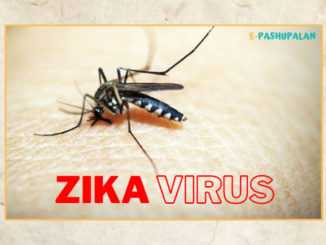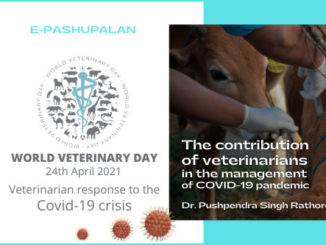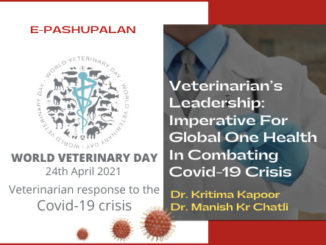The devastating COVID-19 which created havoc and led to pandemic globally was first reported in Wuhan, China and subsequently spread worldwide. This highly contagious virus spreads rapidly and continuously evolves in the human population. The COVID-19 pandemic has caused massive damage to the world economy and continues to affect human lives everywhere. This pandemic has impacted a big population in numerous ways. It has put considerable pressure on public health services across the globe. Scientists are working round-the-clock to understand the virus and its evolution, in order to develop therapeutic and preventive strategies to respond to this human health crisis. It undoubtedly demands team efforts and work across communities and this is only possible when expertise of different fields viz. Veterinarians, Medical officers, Epidemiologists, etc. work together and create new ways of thinking to deliver solutions at the large scale. This pandemic awakens the need for longstanding and sustainable One Health collaboration.
The role of Veterinary professionals in promotion of public health cannot be overlooked whether it is in the field of Veterinary medical research, Zoonosis control, ensuring food safety and thereby ensuring consumer’s health. Unfortunately, the Veterinarians’ response to the COVID-19 crisis has been unacknowledged so far. It would have not been possible to trace its original presence in the bats without the expertise judgment of the Veterinarian. Even not being recognized initially under ‘Essential Services’ category, veterinarians continued to give their multiple services and performing their duties such as treating animals, attending outbreaks, inseminating dairy animals, meat and milk inspection, and many more amidst lockdown period. Veterinary professionals have been volunteering in hospitals and laboratories where human resources were not sufficient. Many Veterinary Universities/Institutes in India have provided their staff and infrastructure facilities for conducting RT-PCR test for COVID diagnosis. Few veterinary clinics have donated essential materials such as personal protective equipment and ventilators. Veterinary epidemiologists have been supporting their counterparts in the public health response to track the disease in humans and to support the development of effective public health interventions. Veterinarians adapted practices to ensure an appropriate level of biosecurity, wear protective personal equipment and social distancing that safeguards the health of our animal patients and their owners. Veterinarians have provided medically necessary care for the animal patients at a time when many people are relying more than ever on their pets for critical emotional support. Moreover, Veterinarian’s role in ensuring the integrity of our food supply and the livelihood of our Nation’s farmers is utmost essential for public health and economic viability. We all cannot forget the horrific view during nationwide lockdown period due to COVID-19 pandemic, when millions of disappointed people were returning from cities to the villages with their families. At that time of struggle, animal husbandry sector was a big ray of hope for their survival. Many people started small scale dairy, poultry, goatry, bee keeping or fishery works and now most of them have successfully turned into full time profitable and sustainable business.
Vets across the globe are engaged in research to understand the ecology of emerging zoonotic diseases that are being transmitted between animals and humans. Veterinarians and their teams provide important animal and public health disease surveillance to prevent disease outbreaks, including of zoonotic diseases. They ensure food security and that people have safe food to eat by ensuring only healthy animals and their products can enter the food supply. Veterinarians provide medical care as well as surgical and emergency services to ill and injured animals. The veterinary services also include the national and regional veterinary regulatory and inspection services, which oversee the integrity of public health. COVID-19 being an infectious viral disease of animal origin, joint efforts from vets, medical and other associated professionals offers a long term solution to this problem. The crisis caused by this pandemic does not only affect people, but animals are indirect victims of the pandemic too. Some people have abandoned their animals due to fear of the virus. Others have been released because their owners had to move out of an infected area or be hospitalized. COVID-19 has had and will continue to have an impact on the health and welfare of almost all animals including companion animals, livestock, laboratory animals and wildlife, for some time into the future.
Animals play an important role in our society. Not only do they constitute a significant part of our food chain, but they are also our loving companions, and often our co-workers. The COVID-19 pandemic has threatened the welfare of all living kinds. As veterinarians, we are a One Health professional and are contributing in prevention and control of this global outbreak. It is vital that we all work together as a single profession to formulate and adopt practices that mitigate the harmful effect on human and animal welfare. Until and unless we adopt this holistic approach we will continue to suffer from similar or even more devastating problems in future. Thus, we must take this pandemic as a big highlight and understand that we can only prevent future pandemics with an integrated “One Health” approach to public health, animal health and the environment that we all share.







Very informative 👏👏
Amazing👌👌
Good points ……
Vets contribute alot
Vet. people are “Unsung Heroes” during this pandemic 👏👏
Very well written 👌👌